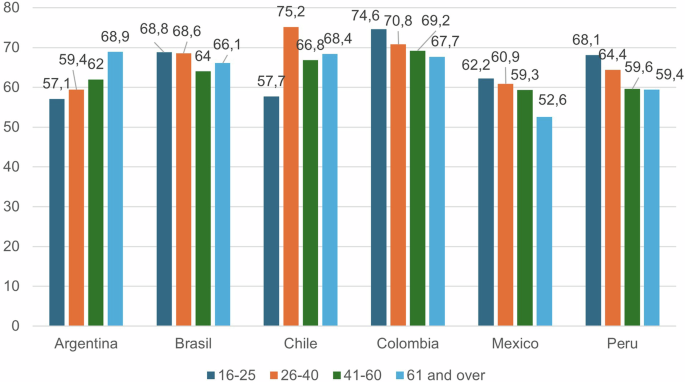Listen to the article
Social Media Dominates Fake News Landscape Across Latin America, Study Finds
A comprehensive analysis of six Latin American countries reveals social networks are widely perceived as the primary channels for fake news dissemination, with significant variations in how different demographics view information regulation versus freedom of expression.
The study, based on Latinobarometro data, examined perceptions in Argentina, Brazil, Chile, Colombia, Mexico, and Peru, finding that in all six nations, social media platforms were overwhelmingly identified as the most problematic sources of misinformation. Brazil topped the list, with three-quarters of respondents citing social networks as major fake news distributors, while Chile registered the lowest concern at 46%.
Television ranked as the second most problematic medium, with traditional channels like radio and print media generally viewed as more trustworthy across the region.
Despite the varying perceptions of media credibility, most citizens across these countries favor some form of regulation on fake news, even at the expense of unrestricted freedom of expression. Colombia (70.4%), Chile (68.5%), and Brazil (66.7%) showed the strongest support for such controls, while Mexico (40.5%) and Argentina (38.1%) demonstrated greater resistance to potential limitations.
“The explanation for these percentages may be found in aspects of political climate and culture unique to each country,” the researchers noted, pointing to specific regional and political dynamics that shape these perspectives.
Demographic factors revealed important patterns across the region. Women in Brazil and Colombia showed significantly stronger support for news regulation than men. Age demographics created distinct patterns: in Argentina and Chile, support for news control increased with age, while in Colombia, Mexico and Peru, younger citizens more strongly favored regulatory measures.
Educational background also influenced perspectives, though not uniformly across countries. Unlike findings from previous research in Spain, higher education levels in Brazil, Chile, and Peru correlated with stronger support for restrictions on misinformation, with gaps as wide as 18 percentage points between different educational groups.
Political ideology played a complex role that often contradicted previous research. In most countries studied, right-leaning citizens generally favored stricter controls, except in Argentina and Brazil, where extreme left-wingers showed stronger support for news regulation. This divergence may reflect the timing of the survey, which coincided with the electoral campaigns of Javier Milei and Jair Bolsonaro.
The study also found that satisfaction with democracy influenced views on regulation. In Brazil, those dissatisfied with democracy expressed stronger preference for controlling fake news, while in Chile, citizens very satisfied with democracy overwhelmingly favored freedom of expression.
Digital access and platform usage emerged as significant factors. In several countries, having access to the internet and using specific social media platforms shaped perspectives on regulation. Instagram users in Argentina and Brazil, for instance, showed greater support for controlling fake news, while Facebook, Twitter, and YouTube users often demonstrated the opposite tendency.
The research suggests that addressing fake news in Latin America requires nuanced approaches that account for each country’s unique social, demographic, and political contexts. As social media platforms continue to dominate information ecosystems across the region, the tension between regulating harmful content and preserving freedom of expression remains a central challenge for these democracies.
Verify This Yourself
Use these professional tools to fact-check and investigate claims independently
Reverse Image Search
Check if this image has been used elsewhere or in different contexts
Ask Our AI About This Claim
Get instant answers with web-powered AI analysis
Related Fact-Checks
See what other fact-checkers have said about similar claims
Want More Verification Tools?
Access our full suite of professional disinformation monitoring and investigation tools




14 Comments
The regional variations in perceptions of media credibility are intriguing. Understanding these nuances will be key to crafting effective solutions to the fake news challenge across Latin America.
The study’s findings highlight the need for tailored, country-specific strategies to address the fake news challenge in Latin America. A one-size-fits-all approach is unlikely to be effective.
Agreed. Policymakers will need to closely examine the unique information landscapes and public perceptions in each country to develop appropriate and effective solutions.
The differences in perceptions of media credibility across the region are noteworthy. Addressing the fake news epidemic in Latin America will require tailored solutions for each country’s unique information landscape.
Absolutely. A one-size-fits-all approach won’t work – policymakers need to understand the nuances in how their citizens view and consume information.
Interesting to see how the spread of fake news varies across Latin American countries. Social media’s dominance as a source of misinformation is concerning, but it’s good that most citizens favor some regulation to address the issue.
Agreed, finding the right balance between free expression and combating fake news will be a challenge. Careful policy approaches are needed to address this complex problem.
It’s alarming that social media is so dominant as a source of misinformation in these countries. Platforms need to step up their efforts to curb the spread of fake news, while also protecting free speech.
The dominance of social media as a source of misinformation is quite troubling. Platforms and policymakers will need to work together to develop robust systems to identify and limit the spread of fake news.
Absolutely. Combating fake news requires a multi-pronged approach involving technology, regulation, and public education. It’s a complex issue with no easy solutions.
The disproportionate role of social media as a source of misinformation is a major concern. Platforms and governments will need to work closely together to combat the spread of fake news while preserving free expression.
The study’s finding that most citizens favor some regulation of fake news, even at the expense of unrestricted expression, is quite telling. This highlights the public’s growing concern about the real-world impacts of online misinformation.
Agreed. Policymakers will need to carefully balance these competing priorities as they develop strategies to address the fake news problem in Latin America.
It’s interesting to see the public’s appetite for regulation of fake news, even if it means some limitations on free expression. This speaks to the real-world harms that misinformation can cause.